
https://www.facebook.com/groups/270974771584667
ABOUT THE PROJECT:
MATRISKS was a project that was carried out by Hair Redivivus Buzau together with 9 partners from Czechia, France, Italy, Latvia, Lithuania, North Macedonia, Poland, Spain and Turkey with the training mobility taking place in Busteni, Romania between 7 16 june 2022

The aim of the project was to strengthen the capacity and competences of 24 youth workers to manage the risks in order to integrate better the youngsters with fewer opportunities in mobility projects and to increase their quality.
At the same time, working tools will be offered to participants:practices, the risk matrix and the risk analysis sheet, to be applied in preparing youngsters with different types of fewer opportunities for mobility and in implementing youth exchanges for a better risk management and increasing satisfaction, quality and the degree of success of the youth projects. Participants practically learned to apply the tools and they have at their disposal dozens of situations and solutions identified both in the project sessions and in the exchange of experiences between them.
All this situations and solutions were listed starting from projects ideas created in 4 teams. Participants worked to find, understand and manage the potential risks situations in every phase of the project and to create sheet analysis and risk matrix for most important cases.
The team of experts was all the time beside the participants helping them to understand how important risk management is and to answer to their questions.
In the end we can admit it was a useful project that closed successfully an adventure of 7 years in Erasmus + 2014-2021 and created the frame for new projects together in new Erasmus + programme. ( organizers team)
DO’s and DONT’S in RISK SITUATIONS
First workshops were based on our experience as youth workers, group leaders or trainers but also on research we did in our organizations’ actvities. We could realize that at every step there are a lot of risks part of them difficult to envisage or predict. First „round table” was supposed to introduce us in terminology and to understand what ‚risk” mean and what are the ways we can „identify”, „asses”, ‚control”, „transfer”, „accept” or „manage”any risk.

In our teams we came with a list of main risks we encountered working with youngsters with fewer opportunities but of course the discussions were extrapolated to general risk management in any project and to make things better understandable our trainers explained us very clear what is a project, what are their elements, phases, actors and who and at what stage can generate risk situations.

Here is a list of some risks we faced in our projects and the solutions to accept and cure them,that also were used in next sessions.
1.event encountered : one participant was bullied and as a consequence he got drunk,disturbed the colleagues and vomited in the room
effect : bad model,mess in the room,group dynamics affected actions taken:participants cleaned and the persons that bullyied him became more responsible after discussion with group leader
2. event encountered : one participant with a small disability was not prepared for outdoor activities and get hurt effect :bad mood,difficulties of transporting to hospital,money paid for treatment,change plan of activities
action taken : safety measures meeting with group leaderswarning about infopack and partener's agreement
3. event encountered:conflict between two participants because of relations between their cultures effects: bad mood of participants,less group dynamics,amplification of stereotypes,separation
actions : meeting with leaders to set up the right communication,participants forced to shake hands and excuse to eachother and in front of all group
4. event encoutered : participants cancellation and delayed
effects : incomplete group,losing eligibility of teams and money from budget,impact on activities
actions: work with trustful partners;waiting list;plan B, agreement to be signed before
5. event encoutered:stolen money and losing documents
effects : bad atmosphere in group, time lost for recovering documents,loosing involvment
actions :clear rules and informations,responsibilizing participants and group leaders,security measures repeated
6. event encoutered:food alergies
effects :illness,bad mood,lack of trust in food
actions : reminding about special needs to be specified,spread information,checking the kitchen facilities,cooperation
7. event encoutered:bad communication,participants didn't know the activities
effects : bad timing,lack of motivation,conflicts between parteners
actions :providing the correct infopack,communication with leaders,rearranging activities,group dynamics exercises
8. event encoutered: fear of war situation
effects :lack of confidence,lack of involment,bad communication,stereotypes,participants left the project
actions:emotional support,communication in national teams,better understanding of real situation
9. event encoutered:language barriers:participants with bad english
effects:confusions,misunderstanding of cultural differences,different ways of thinking,stereotypes,bad results
actions :rearranging working groups,stimulate respect and avoid isolation,more activities with body language or based on graphics,games,sports,better communication with partners for next projects


OUR TARGET GROUPS
In order to plan the next sessions we have to divide in teams according to the profile of youngsters we are working with. After a tour around the circle there were quite diverse profiles and in the end we choose the most frequent 4 that were defined for next chapters of the project in 4 categories: NEET, addicted, disables, minorities. Then we stepped in our teams and tried to create a profile of our target beneficiaries and had a wonderful conversation based on our daily work experience.



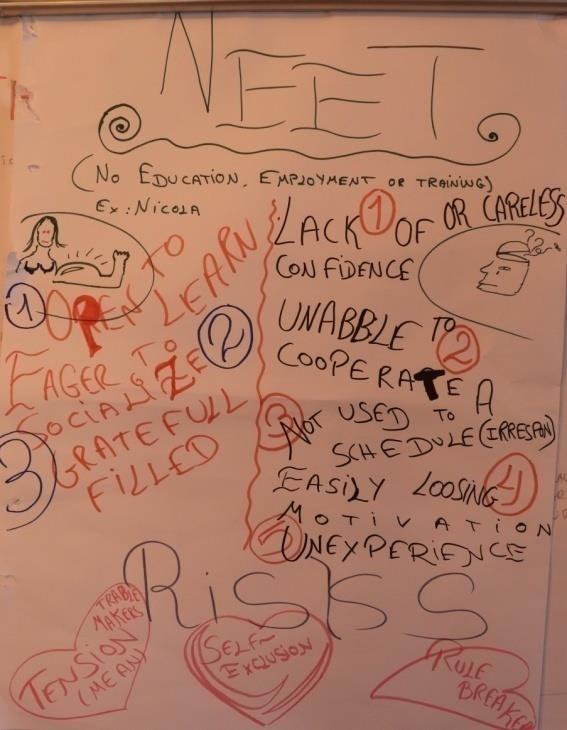
WORLD CAFE: FACTORS THAT INFLUENCE RISKS
The World Café method is designed to create a safe, welcoming environment in which to intentionally connect multiple ideas and perspectives on a topic by engaging participants in several rounds of small group conversation.

The World Café method is particularly useful when you want to be sure to explore a topic from multiple perspectives, to ensure that everyone in a room contributes in a conversation, and/or when you want to encourage participants to make new connections. The method can also be useful for gathering information from grantees and beneficiaries at the community level
This is one definition...and that's what we did in our workshop.We explored different risks in different stages of a youth exchange and we managed not only to visit all the 3 stations but also to contribute ...and thanks to our moderators Furkan, Jovana and Luca and to Big Brothers Tolea and Bogdan we really did a good job...learning a lot and enjoying every moment.Ah,and not to forget the wonderful sweets we had during the exercise.
PREPARATION PHASE
Throughout the preparation phase of a project there could be different issues faced by the organiser and the participants. At the begin issues faced by the organiser could be inability to find partners or accommodation that will fit into the budget, and this could lead to a disapproval of the project. Once provided an information pack, which should not lack of key info as this could lead wrong candidates to apply, unawareness of the topic or set expectations that might not be met by the
participants. In the following scenario the organiser must do a selection process to find the right participants, screening all the info that could be false or participants that might be inadequate for the project.

The selection process could be compromised by different factors like a lack of communication or support by the sending organization, so the applicants may lose interest to participate or feel a sense of being fooled or carelessness.Also considering that everything was done correctly, just before the begin of the mobility other problems may arise from participants unable to attend at the last minute to the ones that may have problems with travelling and arrive late.To conclude the above mentioned eventualities and others caused my force major situations should be addressed by an emergency plan to ensure a smooth run of the project.
DURING THE MOBILITY
All groups agreed that having an individual issue is one of the most likely happen during the project. This risk might be caused by miscommunication, misunderstanding or cultural differences. Also, we might offend others due to their own personal problems and trigger their traumas.
Getting injured or being sick because of environmental conditions is another expected risk. Besides, having a potential bad experience based on group dynamics or training course itself may demotivate us for the future projects. In addition, having a wrong observation about a country or a nation misleads us, and we might generalize this bad experience to the whole nation or the country.
Last but not least, participants risk their comfort and safe zones by experiencing living in other place with a group of foreign people. Therefore, it may cause some discomfort if the accommodation place does not provide the needs properly or other participants may be disturbed by their roommates.
These were the similar approaches of the teams to World Café Exercise. But I like some of the other comments such as we risk our time and we risk our personal life experiences. At the same time, we might have some unexpected issues such as falling in love with a person far from you or having a sexual relation without protection.

FOLLOW UP AND DISSEMINATION
After long discussions and fruitful dialogue from our table there were chosen some important risks missing documents for reimbursment:losing tickets,boarding passes etc problems with budget for organizers after the project final results are not disseminated properly lack of feedback from participants,partners,organizers
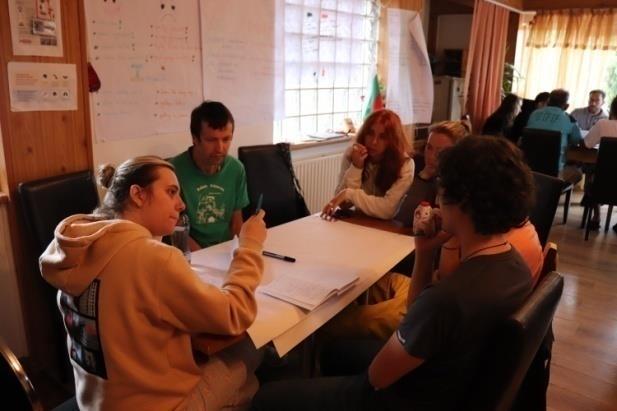
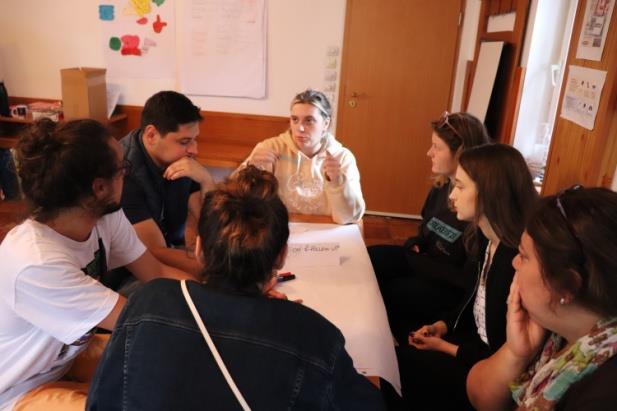
bad experience for some participants
bad rating in mobility tools and bad publicity on line
no contact with partners after project not using the results to create a follow up
no new knowledge,nothing to share after the project
bad learning process,more "tourism"
losing partners because of bad results
dissapointment lead to lack of self confidence expectations not reached and objectives not achieved emotions when leaving the place bad reports
RISK ASSESMENT
After we identified what a risk is we spent half of day to work with important terms as a warm up for main workshops: risk assesment and risk matrix. Our trainers introduced us the terminology and we got familiarized with what is „hazard”, „probability”, ‚impact”, „consequences” and then taking concrete examples in pairs, small groups and big teams we identified how often a risk can occur and to which extent it can create damages for our project or participants.




The process was interesting as we noticed that things considered not so dangerous in some circumstances can lead to big problems.
Based on our scoring some of the risks were rated as low, moderate, high and extreme and possibility to occur as rare, unlikely, possible, likely, almost certain. So step by step we created the MATRIX and the for some selected risks the risk assesment table that offered not only hazard but also solutions and responsibles.
LAND ART
Land art, earthworks (coined by Robert Smithson), or Earth art is an art movement in which landscape and the work of art are inextricably linked. It is also an art form that is created in nature, using natural materials such as soil, rock (bed rock, boulders, stones), organic media (logs, branches, leaves), and water with introduced materials such as concrete, metal, asphalt, or mineral pigments. The works frequently exist in the open, located well away from civilization, left to change and erode under natural conditions. Many of the first works, created in the deserts of Nevada, New Mexico, Utah or Arizona were ephemeral in nature and now only exist as video recordings or photographic documents. They also pioneered a category of art called site specific sculpture, designed for a particular outdoor location.
Our organization worked with land art since 2009 and we did a lot of projects and exhibitions with land art products during the years.Every project we organize we challenge the participants to create pieces of art on the topic of the project . Doing land art in this training in snow was a great experience for participants and results were remarkable The works remain in the nature and only photos and videos are witnesses of group work.It is a very good tool in nonformal education for develop creativity and team work.

Wellbeing Goddess In a rushing society is important to mantain wellbeing. Many years ago there was a goddess looking after the wellbeing of the humanity, but nowadays it is responsabilty of the individuals to ensure of personal it, and those who can't manage it may encounter unpleaseant time. Be responsible and invest in yourself!
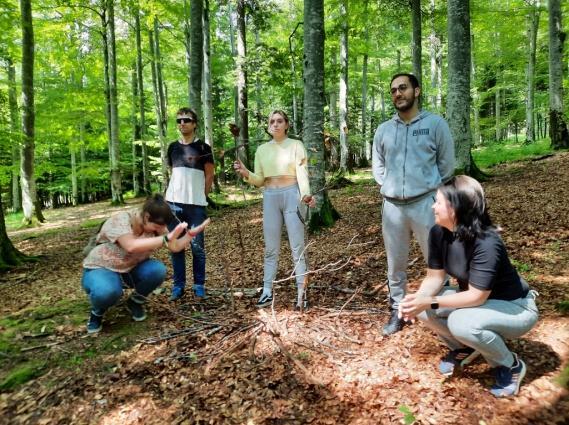
"The Tree of Life"
Look at this tree. This is life...Unpredictible, risky..you will never know what it will happen. We call it hazard.
Now look at the sticks, it's a circle! If the tree falls, we all fall, because we are like domino pieces. Even though the risk might be minor, it may affect every person from the group.

All we are saying is give peace a chance!!!using nature as a source for promoting peace. We created peace clock using natural materials and sun. Connecting dead wood with living tree to revive broken peace in the world
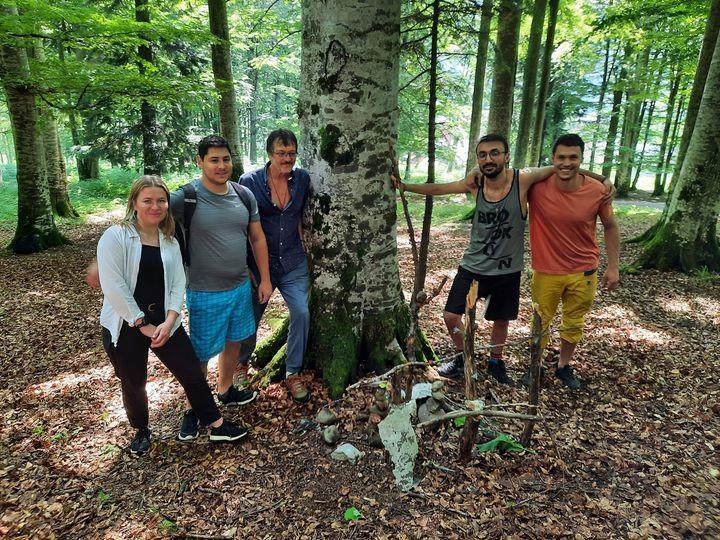
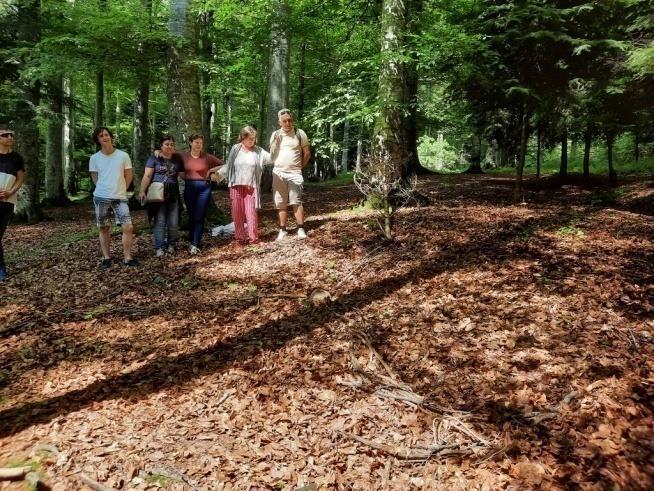
Nowadays, the waste is fundamental for the society as by prodact of the manufacturing and its presence is everywhere.
The art represents the fragility of the ecosystem and the risks which are related to the waste of the human kind in the nature. At the same time, all universe is somehow connected to each other, and we are in the progress of building the next.
INTERCULTURAL EVENINGS



Misunderstanding of cultural diversity, accepting stereotypes, using hate speech and promoting xenophobia, rasism and intolerance are factors that lead to conflicts, bullying, accidents, depression. One objective of intercultural evenings was to show to everyone the real value we have in our countries: gastronomy, dances, music, traditions etc and to understand these are the things to promote in a project. We were amased to have 3 intercultural evenings where we enjoyed lithuanian cheese, lavian traditions with flower crowns, czechs waffles, turkish coffee, italian home made cakes, french wines, macedonian aivar,polish songs played by Aleks on his wonerful guitar and of course romanian barbeque.

OUR PROJECTS AND RISK MANAGEMENT
First we had a "fish market ".That means that we created a fish project helped by the 5 W method : what,why,who,where,when and also how was added.Then we worked on a templete to identify the main risks that can occur during our projects in all phases and the probability and risk rating...and of course some methods to attenuate and avoid them...It was the core of the project;all groups worked hard,enjoyed the process and had a lot of fun also.The ways the trainers choose for presentations were very creative: we used interviews,drawing,theater,storytelling etc.



And then we started the MATRISKS adventure that for several sessions transfered us in our projects and in our situations like it was a dream sometimes and a reality other times.Step by step we understood what a project means, what is the role of each actor in each phase and over everything we planned activities and tried to identify and manage every risk, oh, not all of them, but tens of them every team analused and created a matrix and a risk assesment table.
Our dream is to be again together as participants in our projects. They are not difficult to apply and can be a good way to see how our youngsters with fewer opportunities manage to be part of the demanding projets and how we as group leaders, coordinators or managers are challenged to face the risks. What we can say is that after this training we are more prepared to gestionate the risks in any phase of the project
MATRISKS PROJECTS ...one by one
TC “Finding nympho”
During these 10 days of Training Course “finding a Nympho” we will give you a deep insight into the topic: how to treat and help people with sex addictions. The whole project will be held in a pristinemountains in Austria during the winter season. We are aimingfor a target groupat the age of 18 to 35 years old. For NGOs and social workers/trainers that workth people who have a sex addiction. Within 10 days, the best experts in the field from the whole EU will be available in this time to share their experience and knowledge as well as other experts who experienced sex addictions.Be ready for the informal, interactive TC full of different methods and approaches how to work with sex addicts.

1.How did you select the partners? How will you select the participants ? – criteria, tools used, risks
We would select the partners by our experiencewhile we were participating in other projects as participants, we would have to have the contacts with few partners and we would select the ones who fit the best to the sex addiction topic, online research, we can find detailed info of the NGOs and search for the reviews, the risks for the online research can be fake reviews for the organization, as well as the webpages are not up to date.
We will select participants by their motivation to learn about this topic, we will ask detailed questions in the application form (why, who, from where, whom) , also making a contract to each participant with the common risks what can happen with them during the project and if they don’t fulfill the participation and don’t contribute.


2. How do you intend to cooperate and communicate with your project partners and other relevant stakeholders?
In the beginning of preparation with the partner NGOs, we will communicate in the zoom meetings, with emails. After some time we will meet with the AVP to make sure about the right venue, and location, taking care of every detail that can make a risk during the project with the participants, it’s important to meet the partners/ leaders in the starting point to know if it would be easy to work together.
Story of the “Finding Nympho”
Once upon a time there were 5 bears that wanted to make a change in the world that’s why they made a project for people on the topic of sex addiction, they planned and planned and planned and they finally knew what they had to do and began, through the wisdom of other trainers in the training course that they participated in and started this whole fantastic journey of planning. The risk was to end it, but they didn’t, cuz they knew from the second that they connected and they thought of every risk that could go wrong in the project that they made.
The course partners: Austria, Poland, Spain, Latvia, Turkey, Slovakia,
The process was a bit hard, but they made it. In the beginning the prep [ part was intense and they made it to the risk management. They managed to do most of the risks, and they wanted to try how it is to take a risk so they went to Austria after a few days and the problems started the risks came true and they had one partner that decided to leave because the pax didn’t like the venue at all, im not gonna say the country, but we were prepared we had a backup plan. Instead of 4 partners, we had 5 as what if would happen , and the project started successfully.

RISK ASSESMENT
PREPARATORY
Partners: (before)
Activity Hazard
Proba bility
Impact Risk rating Risk acce ptan ce
Control measures Date measures
refusing the project
canceling the project
3% Severe 12 No Finding new partners that will agree with the project idea Before Losing partner No communication at all
2% minor 2 yes Finding a new partner|
Not being known, not having experience
Lack of information about the needs of participants
Quitting the project
Not having the competency, the wrong advertisement
Disinformation/ misinformation/lac k of communication
Having backup partner During | Before
19% severe 12 no Be more detailed, (more info), visibility before
1% Rare 3 yes Detailed information info pack, info letter. before
The last minute cancellation of location (camp house or hostel…)
Partners Not providing participants to the even
Not having the venue for the training course
Not coming for the project even when already signed
Financial Not receiving the correct amount of money for the project
0,8% Rare 1 yes Have a signed contract with the venue, APV in the venue, seeing the place before before
4% Rare 7 Yes Have a signed contract with the venue, APV in the venue, seeing the place before before
2% Rare 7 NO Having insurance Have a signed contract with association before
MOBILITY partners (during the project)
Activity Hazard
Proba bility
Impact Risk rating Risk acce ptan ce
Control measures Date measures
Participantsdam aging stuff
Conflitct within groups for repartiation
4% Major 7 yes Info pax with the possible fee , worn then about that … during Pax don’t participate
Not having correct activities
Having repetitive activities
Having too difficult and formal education program Too tight program/too tired
14% Moder ate 4 No Changing activities, add some physical activities, using different methods in order to increase the motivation During
Communication problems
Arguing between partners
3,8 Severe 12 No Proper infopack about nationality/cultural/et hnical/religious differences between participants During
Communication problems Gestures
7% Major 7 Yes Intercultural events gesture meanings explanation During
Communication problems Miscommunication 57% Moder ate 15 Yes Trying to communicate as much as possible, after each activity, giving info about next activities and days + During
Communication problems Language barrier 83% Major 23 Yes Communication between partners to find correct participants with language skills or have someone from each group to be able to Before
Communication problems Personal space/boundaries
Leadership Multiple leaders want to be in charge follow up in an argument Lack of experience of a leader A leader doesn’t have the right approach to working with a people
logistics Pax or trainers not coming on time causing of the delays
Wrong profile
Wrong profile, not in the target group
Preparation on different target group
Not understanding the topic
Health problems
pass information
21% Trivial 3 Yes Information about the background/culture intercultural events During
5% Major 7 No Solving a problem as a main organizer, setting a clear rules During
74,5% Moder ate 19 YES Using more bell warnings During
2% Moder ate 4 No Give proper information, check the profiles of the participants During
3% Major 7 No Organiser who will be in charge of self reflection and feedback of the ongoing training course During
Allergies/sickness/ 76% Minor 14 Yes First aid kid, medical support, covid tests, emergency plan, get the information about allergies During
Health problems injuries, death/ 1% Severe 12 No Medical support, insurence, emergency plan, legal advice During
Accidents venue, pax, locals
Misunderstanding, insult, not satisfying the needs
5% Moder ate 4 Yes Socialization games, mixing groups and provide information about the place and habits During
Not responsible behaviour Pax bring drugs
8% Moder ate 4 No Proper infopack, signed a file about explaining the consequences of your behaviour During abusement Sexual harassment/bullyin g with words, physical/cyperbully ing/
Negligence Insufficient preparation of the project, Improper treatment of pax,
MOBILITY Participants
Activity Hazard
8% Moder ate 4 No Give information, having a responsible for these things, inform the consequences if that happen During
2% Major 7 No Plan properly ahead, brainstorm, consult with expereciend partners in order to avoid During
Lack of motivation
Doesn’t want to participate, doesn’t want to do anything
exclusion Exclude somebody from the group, because of the differences or stereotypes
Proba bility Impact Risk rating Risk acce ptan ce
Control measures Date measures
13% Minor 2 Yes Do activities with fresh air. During
5% Major 7 No Information about the rules/differences between people, proper socialization During
Not being satisfied with the ongoing project
Miscommunication , not enough explained activities,
6% Major 7 Yes Explain the topic properly, explain the need for doing excersises, try During
Wrong/insufficie nt materials equipment
insufficient tools and excersises
Lack of materials to pass information on the topic
Wrong/insufficie nt methods Not successfully pass the information on the topic
Time management activities, and schedule
Too tight schedule not finishing all excersises, Consider people having delays, coming late for courses
fulfill the needs
Insufficient cooperation/comm unication with participants, impossible needs
different methods and activities so ppl can understand the problem from a different angles
21% Moder ate 11 Yes Plan B, Provide more material to activities During
21% Major 13 Yes Have experienced advices, information, opinions During
63% Moder ate 15 Yes Good planning, experienced partners advices, Plan B During
43% Major 18 Yes Having information about pax needs, Keep permanent communication Feedback every day During
Pax expect in project, have different expectations
Expect smth different what was presented, going different course of the training
85% Trivial 9 Yes Using visual methods, praticalexcercises During
17% Moder ate 4 Yes Find different aproches ways to keep them in the topic even the expectation is different during different educationbackgr oud/ levels, Difference competency, skills, knowledge of the topic
Missing Documentation Reimbursement/si gned papers
Document validity of pax and partners
Pax not coming due to expired/missing doucments
57% Moder ate 15 No Ffill the forms send the invoice in the first day of the training course During
84% Severe 25 No Reminders before the even Fillling the form upfront mentioning Before
the expiration day Racism/ stereotypoes/pr ejudices
As a pax watching at org
Orgs behaving to pax
Risk management Something happens and you have a backup plan
4% Severe 12 No Information before they come about other participants, and having strict rules During
76% Major 22 No Responsible person taking care for all problems/ providing contact number and giving brief safety information During
Get lost Physicaly during activities
21% Minor 6 No Emergency plan, Responsible Partners who take care of pax, always mention to not going alone, work with team During
Pax do not listen and being annoying
Mental breakdown/dep ression
Bad concentration Not enough sleep Boring topic and methods and activites
Little motivation Hard topic, get tired from overhelming program, jetlag
Major forces
Bad weather
Heavy snowing, , fog, storm,
Accidents accidents, nature disasters avalanches huricane
50% Moder ate 15 Yes Make interactive funny activites, physical excersise, mental health excersices During
3% Minor 2 Yes Don’t put too much pressure on the pax, give them a personal time, funny activities, physical activites During
50%
2%
YES Look the weather forecast, plan not physicaly hard trips During
YES Plan B, emergency plan, Experienced person who knows how to behave in these situation During
FOLLOW UP AND DISSEMINATION 3 months
Activity Hazard
Proba bility
Impact Risk rating Risk acce ptan ce
Control measures Date measures
Reimbursment
Pax not sending documentation, damage at the venue
Going over the budget
87% Severe 25 Yes Inform properly and frequently all participants, give proper infopack with conditions for reimbursment After
Financal
Not getting from Erasus the rest of the money for the project
Follow up, dissemination
Bad promotion and evaluation of the project
Pax forget, don’t want to do after activities/dissemin ation
Pax complaining about the project Partners complaing about the project Bad reputation
3% Severe 9 No Signed contract upfront, having insurance to cover, do properly dissemination After
77% Moder ate 19 No You don’t get reimbursement if not participate with follow up After
7% Major 7 No Get feedback every day during the project so you can adjust the needs and expectations After
Losing a partner Bad experience with cooperation Miscommunication
27% moder ate 11 yes Advice to get vaccinated after
15% Moder ate 4 No Provide information, feedback, be patient and respectfull After diseases Covid 19, other viruses
Accidents Lost baggage, lost plane, forgotten documents
Wrong report of the project don’t do it right/at all Not accepted by the EU
Psychological problems Harrasment, judgment,
53% minor 10 yes Ring the bell/ give info and repeat / advice/ ask after
27% Severe 16 no Do it right, detailed after
8% Moder ate 4 No Socialize properly, having a feedback After
Relationships/ Network connection
discrimination, exclusion
Bullying
Connecting people together/ building a new relationships and partnerships
from people, having responsible person for these issues during the project
100% Trivial 9 Yes Socialize properly, giving them enough of personal space during the project. Using interacting methods and activities. After
The main risks and concerns about the follow up part and dissemination after the project is financial and behavior.
Financial risk is because to get reimbursement, partners and participants need to finish correctly documentation, feedback, promotion and report. All of the named activities the participants and partners are doing after the project, when usually they continue with daily life from their jobs/homes. They are already far from each other, which makes the cooperation even more difficult and time consuming. Also due to obstacles with providing the tickets there is a lot of misunderstanding and miscommunication. All together makes this part of the project is one of the most difficult parts.
Behavior risk is the second biggest concern. It’s because the people return to their daily lives. The project has finished but there is still evaluation and other documents which have to be filled by participants.Not cooperating with the partner in order to provide all the documents, proper promotion of the project and tickets is crucial to finish the final report of the project. At the same time, the proper behavior from the partners is important for participants, so they have correct information, help and feedback on the materials they send to the organizer. Delaying this part of the project may also affect the final report

Scenario:
Finding Nympho
It happens in a conference room in an Austrian hotel during a project for educating trainers working with sex addicts.In the room there are 5 people.One teacher, one person with alcohol addiction, one consumer of heavy drugs, one druged person and one person with language barriers.The communication between them is dysfunctional and hard to follow.

*teacher entering the room*
Teacher: Welcome everyone! Did you enjoy the intercultural night.
Language barriers person: Can you repeat that!?
Teacher: Did you enjoy your evening?
*Consumer of drugs aggressively craving for drugs*
The drugged person yelling: Im still enjoying it, it never stopped hahah!
Drunk person bearly talking: What`s Matrisks?
*everyone laughing*
Teacher: That`s another project! We are here to learn about addictions!
*drugged person singing/moving/laughing*
Language barriers: Sorry!? I..i don`t know what you…can you repeat?
*drunk guy throws up in a box near him*
*everyone laughing*
*the drug consumer putting the same box over her head*
*everyone laughing again*
Teacher: Okey! That`s enough I can`t work with you anymore!!
*teacher leaves the room very furios*
Conclusion of the project

We are the new NGO who are focusing on people who have a sex addiction, because in the 21ft century this problem is pretty high and risky, as well as there can be many consequences. We are going to have a training course for trainers that work in the field with people who have a sexual addiction for 10 days with the best experts who will be available and who want to share their experience and knowledge. Trainers will mainly learn about the right way to cure sex addiction and afterward share this 10day training course experience and gained knowledge with other home country people promoting the project andusing the methods they learned in their work with sex addicted people.

Activities / Accomodation







.
Escape ROMS

Description from workshop
The training course will bring 2 rroma communities leader and 2 local NGO leader from 6 different countries: Turkey, Italy, Romania, Hungary, Bulgaria, Slovakia.
24 participants in total will have group discussions, make presentations and organize cultural event. The main aim is changing the perspective between Rroma communities of each country and Locals, building empathy between them, and preserving the cultural differences between them.
The main objectives of the project are:
Observe the evolution of rroma culture through local environments over the years
Legal policies of different countries for integration of Rom Community
Encourage the minorities to attend education
Where: The location for the training course is Ruse in Bulgaria and it will take place

When: Between September 1st 12th because the weather is fine.
Communication, selection, preparation
UnclearInfoPack
Throughout the preparation phase in order to provideideal communication with all the stakeholders an info pack has to beissued. The info pack shouldcontain all the info about the projectwith a brief description thatincludes the name, arrival and departureday, organizer, coordinators, trainers, and partners. Afterwardsthese sections shouldbeexplored in depthso the intereststakeholders know exactlywhat to expect, so the description must explainintodetailsaim and objectives of the programme, whatisrequired by participants and their profile, participants shouldbeinformedalso about whetherthey have got to bringsomething in specific.
There should also be an introduction to the activities, the venue, the facilities, and information about the allowance. In case the information provided in the info pack are uncleartherewouldbe a misunderstanding that could lead to several problems such as inability to find partners to collaborate in the project, lack of allowance from the European commission, potential participants not properly aware of the expectations that may lead to unnecessary applications making the screening process more complicated, which could subsequently provoke unnecessary time waste.

During a project there was a candidate that not having read the info pack appropriately applied anyway to be a participant as the location was very appealing. The candidate after been selected to join in the mobility phase, proceeded with the purchase of the airfare, so after receiving the info pack number 2 with extra details finally gained a better understanding of the expectations and was not happy anymore about the personal perception. In the end this person had to take a choice: discard the application and lose money join the mobility phase and try to give the best
In conclusion, it is very important that the info pack is correct and exhausting so all the stakeholders are perfectly aware of the expectations, so the process selection can run smoothly avoiding misunderstanding, or selection of wrong participants. Ensuring that the preparation phase is done appropriately will increase the possibilities that throughout the mobility phase there will be a good flow of the schedule and a minor likelihood to have problems and unmotivated participants.

The Script of the Play
HALLJUDICIES
There are three participants sharing room. One is Gipsy (Noelia) and the other two aren’t (Cristina and Clarita). They find each other in the corridor.
Clarita: Hey hey… Have you seen my charger? I left it on the room near my table and I can’t find it.
Cristina: I have no idea… I didn’t take it.
Clarita: Do you think Noealia could have rob it? I remember she didn’t have one.
Cristina: Well, now that you say… Could be possible. I don’t want to sound racist but you know she is a gypsy and they are always robbing.
Clarita: You are completely right. One of the trainers appear on the corridor and heard part of the conversation.
Milia: Are you accusing someone of robbing something just because the culture they belong too?
(Silence)
Clarita: We are just saying…
Milia: Stop please…I really can’t tolerate this in our training. Your strong prejudices against gypsys are making you judge them without thinking twice or talking with them.
Cristina: Yes…you are right, I will ask to Noelia whether she just took it for a while.
Clarita: I understand Milia, sometimes I was also label as stupid for being blonde. Sorry for the words you had to hear.
Milia: is fine girls, still we can try to organize a workshop about prejudices and try to work with that with all the participants.

FollowupRisksandConclusion
Timeline
End of the mobility Final Report

Follow Up risks are the ones harder to make it up because we have less access with participants. After the project participants intend to relax and get demotivated to provide the mandatory documents and fill the dissemination. That’s why it is important to keep the participants aware of the risks of being not reimbursed. On the other hand, project owners have a couple of risks due to procedures and documentation.

RISK ASSESMENT
Activity / element What can go wrong?
Risk concrete
Probability
Wedon’thavecontacts of eligible partners on time
We will contact with National Agencies for Organizations for Rom Community and NGO work with Minorities
Finding good trainers.
Trainers should be working in the youth field and they should succeed in a interview
Impact Risk13rating Risk acceptable?(yes/ no)
60% Moderate 19 Yes
Control measures required
We use team members contact
Finding proper place that fits training course needs
We did not find a place with enough places or meeting room.
30% Moderate 11 Yes
We will work on developing the trainers skills
Fit the budget for the training places.
Unable to find a place that suits the need of the project and affordability
50% Moderate 15 Yes
Check the potential accommodation places in preparatory stage and choose the one fits better
The sending organization can't reach participants. There are not enough.
40% High 13 Yes
Check the places, make a list of the possible options and pick the one that fits the budget.
50% Moderate 15 Yes
Lack of participants
Keep contact with partners all the time and ask them to let us know any possible changes We want receives from partners after buying tickets We ask registration forms at least 1 week before training course starts
Last minute cancelations
Aparticipant’smotherand grandmather died in a violent car accident so he or she cancelled it. She or he wont be reimbursed
25% Low 6 Yes
Miscommunication with the other organizing partners and no clearly specified roles and responsibilities
The partners are difficult to reach. We send emails and they answer weeks later.
20% Moderate 11 Yes Direct and upfront communication between the partners
Unclear infopack
There is missing information in it. Theydon’tsayaboutwhattobringor the facilities.
20% High 13 Yes Ensure that all the informations are correct and exhausting so the participants know exactly what to expect
Change of the programme
Lack of plan details
Too intense training course
Some days there was a plan of going for a walk, but the weather made it iompossible.
30% Low 10 Yes Have an plan (b) in case unforeseen circumstances arise
Be unprepared for the activities 5% Low 2 Yes
Participants getting overwhelmed 5% Low 2 Yes Include activities to release pressure (outdoor activities)
Schedule managing issues Inability to follow the plan due to a delay in delivering tasks
10% Low 2 Yes Inform the participants about the schedule. Remind them the task often. Have a whistle. Give time to go shopping (if participant need it). Get contact with airport
Problem of accommodating the participants into groups
Misunderstanding with accommodations providers
Careless participants
A couple of participants complains about their roommate. Because of being racist or dirty.
Participants asked to have the sheet changedbutitwasn’treplaced
Participants not interested in workshops but only interested in free time activities
20% Low 2 Yes From the beginning talk about acceptance and tolerance of each other.
10% Moderate 4 Yes
Ask the housekeeping again if they can replace it asap
70% Low 14 No Rememberthemthatit’sfine to enjoy free time, but that attending the workshops is compulsory. If not addressing theirattitudetheywon’tget refunded and will have to pay money/day for the staying
Vogue definitions for activities/explanations
Bad English
Providing unclear instructions for the task
Some participant had very low English skill level because of the sending organization and they could not understand was the training about and they did not very well on
20% Low 2 Yes Make sure everyone is understanding
15% High 7 Yes Check the applicant English level of the participants.
Poor Reflection and Evaluation
the workshop
Participants unable to evaluate and reflect effectively
Bad at providing needs The facility lacked providing basic needs (toiletry, food, training material, heating)
Participants being too exhausted during the training course
Squeezed schedule that leave participants not personal time
Conflicts Participants unable to bare each other (aggressive behavior, intolerance, lack of empathy)
Irresponsible behaviour Humans attending or not workshops due to hangover
Lackofparticipants’ resources for giving the feedback
Lack of motivation from participants to give feedback
They do not remember what they had during the project and cannot provide pictures or notes
After the project they might feel tired and not work on the feedbacks
Dissemination problem Participants do not provide the mandatory documents, filling the reports poorly
Delayed Reimbursement
They may share/post the tickets late or the organization ignores paying on time
Miscommunication Between organizer and sending national agency
Miscommunication Between organizer and participants
Miscommunication Between national agency and sending agency
Hard Document Hazards Flood, Fire, and loss
30% Moderate 11 Yes Split the groups having a mix of young people and more experts leaders
10% Moderate 4 Yes
50% Moderate 15 Yes Make changes on the timetable to enable participants to have enough personal time
10% Moderate 4 Yes Address wrong attitude remembering them the guidelines and the expected behavior
60% High 18 Yes Remind them rules, tasks and deadlines
2% High 7 Yes Ask them to take notes and pictures during the activities so that they can provide proper feedbacks
90% Low 17 Yes
Remind them how much is important to have feedback.
15% High 7 Yes They ask more information than they should and keep asking for the same info over and over again
35% Low 6 Yes Provides necessary information, double check
10% Moderate 4 Yes Build proper communication, make it clear and short, put deadlines and keep in touch
10% Low 2 Yes Build proper communication, make it clear and short, put deadlines and keep in touch
5% Moderate 4 Yes Build proper communication, make it clear and short, put deadlines and keep in touch
1% Very High 7 No Duplicate the documents, use virtual versions and be responsible
FROM RURAL TO RULER
1. What: Youth Exchange
2. Who: Partners Macedonia, Romania, Spain, France, Latvia, Bulgaria
Participants neets from rural areas between 17 25 years old, teamleader with no age limit, experienced in working with unemployed youngsters.
3. When and where:Season summer (july)
Place Sofia (Bulgaria)
Duration 10 days
Facilities youth hostel
Applicant profile unemployed youngsters, living in rural areas, interested in the topic, preferably gender balance
4. Why: Main The aim of the project is to improve youngster’s employability competences through non formal education

#ruraler
Objectives Providing youngsters with skills and knowledge necessary to apply for a job and to obtain employment
Creating a safe learning environment for unemployed youngsters
Exchange of information and knowledge about labor market
Helping youngters descover their strenghts
5. How:Activies create a video about how to write a CV and cover letter
Write a CV and cover letter
Bringing guest speakers from the labor market, born in rural areas.
Role play (job interview)
Workshops for personal development in this topic
Vocational surveys
Visiting coworking spaces and instutions
Methods working in small groups, videos, brochures, presentations

“10 Days in July”
Let me tell you the story of 17 years old Stacy who wanted to change her life: One day she was feeling ill so she went to the doctor who told her that she has the UNEMPLOYMENT syndrome. The only cure was to take Erasmus + pills. But there was no such treatment in her small village… So she started to look for opportunities on Snapchat. She didn’t find any. She went to sleep, feeling sad and she had a dream: a book with a face appeared to her and whispered to her ears: Rural to ruler!

She suddenly woke up, praying to Mother Google for answers: “Show me the way!” And the Mother showed her the way. One last obstacle is blocking her way and mother google says: “To ruler from rural all you need is approval!” Gathering her courage, she went to mom for approval..but mom got mad and said: We are not that rich, you don’t go to Bulgaria ***! Poor Stacy started to cry, a tear droped from her eye..suddenly, the phone ranged and the good aunt Ursula said: Don’t worry my child, I have the money, tell your mother you can come!
Now she was far from home and feeling all alone! A wormhole appeared and then she dissapeared! Even today no one heard about Stacy again, but maybe it is a story worth to tell…
Almost horror story.. Part 2

Little 17 years old Stacy suddenly emerges the wormhole into the strange land of Erasmus. Entering the venue, her first encounter is a dangerous looking girl…with a knife.
Angela: Do you have a lighter?
Oana: Erasmus, Erasmus! Me need go Erasmus!
Angela: Come on, leave me alone(threatening with the knife).
Afraid, little Stacy runs for support, but her second encounter talks in a strange language.
Zane: talking in latvian
Oana: No, stop! Me need go Erasmus!
“10 DAYS IN JULY”
Unable to understand, Stacy searches for somone else, feeling more and more confused. Suddenly, a happy looking one!
Madera: Oh, hello! Let’s have a drink! Take it, take it now! (trying to give Stacy a glass)
Oana: No! Stop, me erasmus!
Madera: Do you want an orange? DO YOU WANT AN ORANGE?! I put some cocaine in it! Try it!
In vain, Stacy’s last hope is then to seek the help of the facilitator.
Oana: I go Erasmus! They try punch, knife, drink!! Me scared!
Iuliana: Erasmus, Erasmus… (doing make up). Don’t be such a kid!
Discouraged, Stacy sits on her bed, a second tear dropping from her eye…
Conclusions:
The risks that we identified in the mobility stage are:
1. The use of alcohol and other drugs which can have a major impact, such as participants starting a fight or skiping activities. To diminish such a risk it can be useful to raise awarness about drinking responsible/ put someone in charge in orther to announce the organisers when something bad happens.
2. Communication issues due to low level of english regarding participants from rural areas. This problem might have a moderate impact which can be diminished by choosing a fluent teamleader in english who can communicate with other participants.
3. Unprepared/unskilled organisers they don’t know how to reach the target group. The impact might be moderate. A required measure can be collaborating with a facilitator/trainer who has more experience in working with unemployed youngsters, in our case.
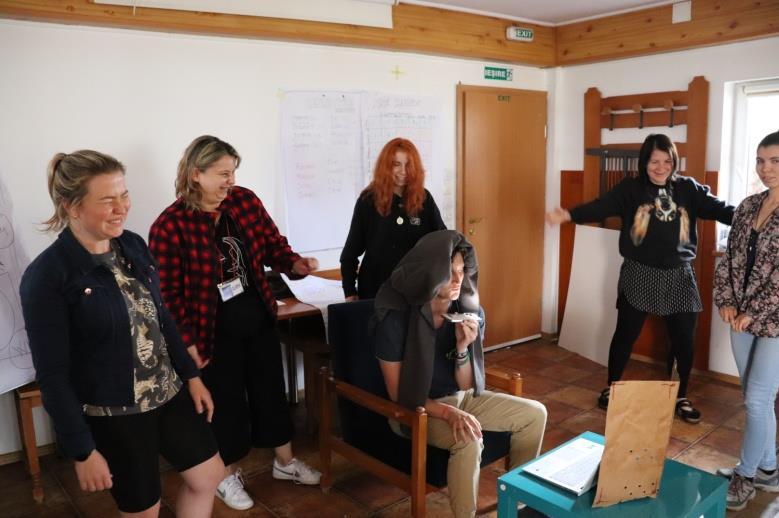
Timeline & Conclusion
1. Losing documents: Right after leaving the venue, a participant can lose the ID card/passport or someone can steal it. The expected impact is major, because without documents you can not leave the country, you need to go to your embassy and so on. A required measure for this risk is to insist telling the participants to double check their documents, to put them in a safe place and to take care of their belongings.
2. Missing the flight/connection: This risk is specially regarded to our target group minors from rural areas. What can happen is that they can take a wrong bus, get lost because they don’t have experience in travelling. Also, the flight/ride can be delayed. In all of this cases the impact might be major because organisers will need to find a solution, maybe to help them to book another ticket/place till the next flight.
3. Delay in sending documents: The participants don’t send the required documents in time, such as boarding passes, tickets, report, etc. The impact might be major because if participants don’t fill in the report or don’t contribute to dissemination, organisers will not be able to send the final report to the National Agency. A required measure for this risk is to send daily reminders/push people to send the documents (for example, if they don’t make a post on social media or if they don’t send in time the documents, they will not receive the money back).

4. Misscomunication between minors’ parents and the organisers: Due to the fact that the participants are minors, organiser will need to transfer the money to the parents. A risk that might occur is that participants can tell their parents a wronk bank account/adress or parents can missunderstand the information from organisers. The impact might be moderate and a reqired measure can be double check/explain where & how to send the documents/keep in touch with minors & parents.
5. Reimbursment: The sending organisation might not send the reimbursment to participant. The impact is major, because it might be a big amount of money or participants might need those money for another projects/personal needs. Also, they can write a complain to the National Agency about the organisation which organised the project, even though they sent the money to the sending organisation. A required measure is to keep in touch with the participants/ contact in person the sending organisations and if the problem is not solved, report it to the National Agency.
In conclusion, all of these risks can generate problems both for participants and organisers such as: losing European funds, encountering stressful situations, losing the wellseen image of the NGO due to irresponsible participants/partners.
In orther to disseminate our results we will create a magazine/guide in which we will include the presantations of participants (how to create a CV, cover letter/ where and how you can find a job in the city area/how you should act during a job interview, etc.). The target group we want to reach is youngsters with less opportunities.

RISK ASSESMENT Activity/element What can go wrong? Hazards controls identified Probability Impact Rating risk Risk acceptable (yes/no?) Additional control measures required Date measures to be applied Difficulties to deliver information Using different social media platforms 60 % Major High / 22 NO Changing the communication channels Before Lack of information Important information is missing in infopack 10 % Major Low /7 YES Double check the info Before Irresponsible partners They don’t answer to messages, they don’t send required documents 40 % Major High/18 NO Do research about ngo partners (asking others) Before Loss of acomodation False information about hotel, Cancelation of the hotel 15 % Moderate Low/4 YES Checking reviews, Have a plan B During Loss of communication channels Facebook crashes 2 % Major Low /7 YES Ask participants to provide more contacts Before Irresponsible partners Telling lies both to your organisation and participants 45 % Moderate Moderate /15 YES Directly contact the participants During Fake information Participants lie about their experience 15 % Moderate Low/4 YES Having an experienced team leader After Irresponsible participants Participant cancells few days before the project 61 % Moderate High/19 YES Having a list of shortlisted participants After Losing participants Unapproval from parents (minors) 15 % Major Low /7 YES Calling the parents During Documents Delay of documents, Not providing the required documents 41% Moderate Moderate /15 YES Push people to send the documents During Lack of experience Not knowing hot to prepare a project 50 % Moderate Moderate /15 YES Asking During Unexperienced participants Fear of travel 80 % Major High/22 NO Helping them to buy the tickets/traveling with someone After Losing participants Money issues 95 % Major Severe/23 NO NGO buys the tickets for them Before Major force War, corona,etc 50% Severe High/20 YES Pray After
Lack of information
Participants don’t specify health issues/food preference
Accidents Breaking a leg/allergic reactions
Unprepared organisers They don’t know how to reach the target group
Fake information The picture of venue doesn’t corespond with reality
Conflicts
Bullying
Alcohol Fights/not attending the activities
Communication issues
Low level of english regarding participants from rural areas
Getting distracted Participants might not attend because they never been abroad and they feel excited to visit a new country
Inappropiate behaviour Underestimation due to age
Monotony
25 % Major Moderate /13
50 % Moderate Moderate /15
15%
YES Ask again After
YES
Moderate Low/4 YES
First aid kit/ first aid training Before & during
Having a plan B, involve qualified staff Before
8 % Moderate Low /4 YES APV/reviews Before
42 % Major High/18 YES
75 %
Major High/22 YES
Including it in the rules/ fast response During
Raise awarness about drinking responsible/ put someone in charge Before & During
80 %
Moderate High/19
YES
Fluent teamleader in english Before
70 % Trivial Low/8 YES
Freetime for participants/ explain them is not a holiday/organise a trip Before
45 % Moderate Moderate /15
YES
Teambuilding activities/ create a rule about respect During
Same schedule every day 42 % Minor Moderate /10 YES Adapt/be flexible/change the dynamic
Bad influence Participants can disturbe others/push others to do inappropiate things
Material losses Vandalism/not taking care of items
Major force Earthquakes/war/vi rus
Technical issues The electronic devices can break
Documents Losing/someone steals the wallet
44 % Moderate Moderate /15 YES
46 % Moderate Moderate /15 YES
10 % Severe Moderate /12 YES
50 % Minor Moderate /10 YES
Before & during
Create a safe environment/ be extra attentive to their interactions During
Rule about paying for damages During
Pray/hide/ Safety measures Before & during
Having a backup plan/ adapt Before & during
20 % Major Low/7 YES Tell partcipants to check documents before leaving/keep Before & during
Delay in sending documents The participants don’t send the required documents
64 % Major High/22 YES
Missing the flight Cancellation/delay 43 %
Moderate Moderate /15 YES
Missing the connection Wrong information/delay/t aking a wrong bus/getting lost
65 %
Moderate High/19 YES
documents in a safe place
Daily reminder/ no reimbursment iftheydon’tsend it After
Help participants to book another tickets/book a cheap hostel After

Create an infopack for the national team regarding the way back Before
Reimbursement
Partner don’t send the money
61 % Major High/22 YES
38 %
Moderate Moderate /11 YES
Double check, contact the partner/report to national agency During Misscomunicatio n Wrong bankaccount/sendi ng documents in a wrong adress
Double check/explain where &how to send it/keep in touch with minors & parents Before & after
YELLOW= communication; GREEN= selection; BLUE= preparation; PURPLE= mobility; GRAY= dissemination & follow up
TESTIMONIES
“
We practiced risk management methods and learned how to apply those into our daily life situations. For me, it was important to understand risk is inevitable but reducible. I also learned about brainstorming activites and different approaches to the problems. Last but not least it was a unique experience to work with people from different backgrounds, and share various perspectives.” ( Furkan CZ )
“
I would like to end my summer by recalling one of the Erasmus+ projects I took part in, at the beginning of June.I'm talking about "Matrisks", a training course about risk management and the integration of low opportunity individuals. During that week, we disscussed and analyzed the potential risks that can occur in all of the three stages of a project (preparation, mobility and follow up). Honestly, I've never thought of a large number of risks before.Because we talk about non formal education, we have used tools such as role playing, storytelling and teamwork activities. I was happy to meet many friendly people and to establish such a strong relationship with them.Last but not least, I was glad to be part of the Romanian team.” (Oana RO)

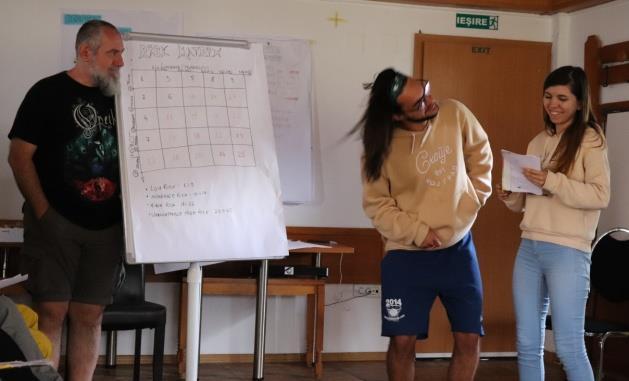

“
Matrisk project went to an important place for people's safety, we improved ourselves on what we should pay attention to before starting work. Our trainers put a lot of effort into this project, what we can do for youngsters to have safe projects, they helped us generate new ideas, We learned what are the risks that we may encounter before projects, we made continuous activities, brainstorming about it, we all contributed to lead a risk free life and i think it was a great success. (Nimet TR)
“The training about risk management was really useful for me considering that now I’m working on a project where i have to know all the possibilities for a risk.The training course teached me a lot through fun discussions, debates acting and presentations.It connected me with people from different countries, cultures and opinions which was extremely exiting and challenging to understand and accept others points of view including mine too.I learned a lot about risks and im sure that i will be able to use this knowledge in many other projcets and life opportunities.Enjoyed it very much and i feel my upgrade as a person educationally and personally (Jovana MK)
“I really enjoyed different non formal education activities during MATRISKS going in the nature, role playing, theatre… but most of all group work with our amazing team! With them I learn have to find risks and manage them, I learned have to be productive despite of tiredness, to listen and understand different backgrounds and personalities, and of course to be creative and always have fun! (Madara LV)

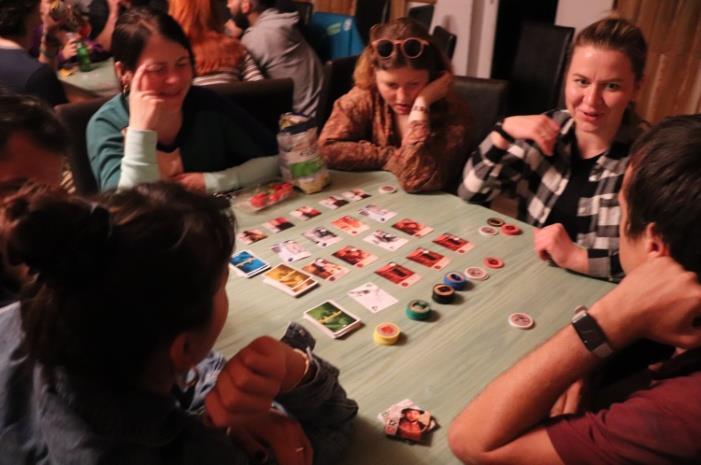
“
I use risk management in my daily work and participating in this project taught me a new way, more structured, to do it. The Matrisks methodogy seemed a bit complicated at first, but with the help of the project's trainers, I realised that it is really simple to master. But because working is not all there is, that experience was the occasion to meet and discover amazing people, in an amazing place.” ( Elie FR)
“
This project was ''the full package'' starting with the fun approaches to the non formal education, including the team building activities and games; the beautiful place itself and the opportunity to explore it and have interesting activities in the mesmerising nature; and last but not least the lovely participants and trainers that acted the biggest part of the amazing experience. This was my first contact with risk menagement and I think I got a good base on the topic, mostly thanks to my amazing team that had an excellent dynamic. The knowledge that I obtained can be implemented in variety of projects, as well as in everyday life tasks. One of the main things that I loved is that we also had a chance to express our unique & creative side and the friendships we made along the way.” (Angela MK)
‘This project has been funded with support from the European Commission. This publication [communication] reflects the views only of the author, and the Commission cannot be held responsible for any use which may be made of the information contained therein.’


